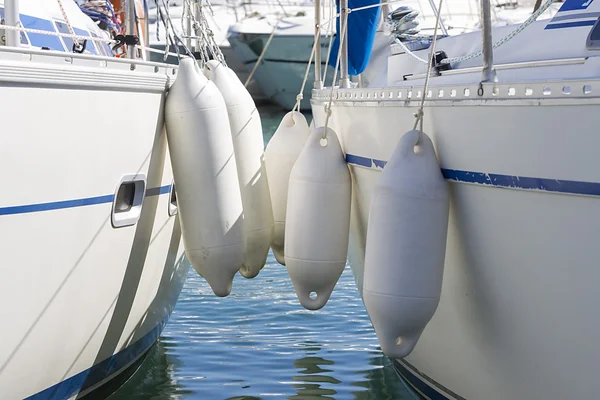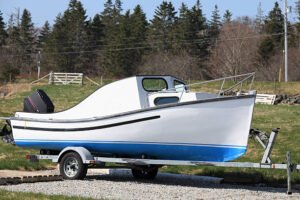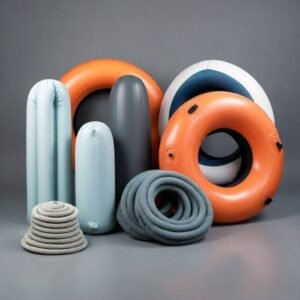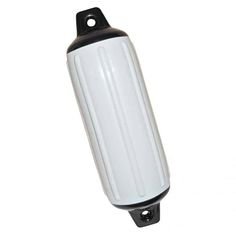You might be wondering, “When To Put Fenders On You Boat?” Well, that’s the million-dollar question, and we’re diving right into it. Whether you’re approaching a busy marina, rafting up with other boats, or facing choppy waters, knowing when to use boat fenders can make all the difference between a stress-free docking and a heart-sinking scrape on your hull. So, buckle up because we’re going to break it all down for you!
What Are Boat Fenders
Alright, let’s start with the basics. What exactly are boat fenders? Think of them as cushions or buffers for your boat. They’re typically made of soft, inflatable materials like rubber or foam and are designed to protect your boat’s hull from banging against docks, piers, or other boats. Simply put, they help you avoid those cringe-worthy moments when you hear a loud “thud” and pray you didn’t just ruin your boat’s paint job.
Why Are Boat Fender Essential?
Now, you might be asking, “Why should I care about boat fenders?” Good question! Boat fenders are essential for a few solid reasons:
They Protect Your Boat from Dock Damage
Imagine this – you’re pulling up to the dock after a day out on the water, and the wind is not on your side. Without boat fenders, your hull could slam against the dock, leading to scratches, dents, or even more serious damage. No one wants that, especially after all the love and money you’ve poured into your boat.
They Make Docking and Mooring Easier
Let’s face it – docking isn’t always a smooth process. Sometimes, it’s downright nerve-wracking, especially in a crowded marina. Fenders give you that extra bit of confidence. They act as a cushion, absorbing shocks and helping you dock like a pro. So, next time you’re coming in hot to the dock, those trusty fenders will be there to save the day.
They’re Vital for Rafting Up
Planning to raft up with other boats for a social gathering or an overnight stay? Boat fenders are a must-have. When multiple boats tie up together, the chances of bumping into each other increase. Fenders act as a buffer between the boats, preventing potential damage and keeping things friendly between you and your boating neighbors.
They’re Adaptable to Different Situations
Whether you have a small fishing boat, a pontoon, a yacht, or a sailboat, fenders are adaptable to different boat sizes and docking scenarios. There are various types like inflatable boat fenders, cylindrical fenders, and specialty fenders, each suited for different needs. Having the right fender can save you from a lot of headaches.
So, in a nutshell, boat fenders are not just another accessory; they’re a necessity. They protect your investment, give you peace of mind while docking, and make the whole boating experience smoother and more enjoyable.
By now, you should have a pretty good idea of why boat fenders are more than just “boat decorations.” They’re about safety, peace of mind, and smart boating. In the next sections, we’ll dive deeper into the types of fenders, how to choose the right ones, and some expert tips on proper placement and usage. Stay tuned, and get ready to become a fender pro!
When To Put Fenders On Your Boat
Alright, so you’ve got your boat fenders ready, but now you’re probably thinking, “When to put fenders on your boat?” No worries, I’ve got you covered! Knowing when to use your fenders is key to keeping your boat safe and sound. Let’s go over some of the most common signs that it’s time to hang those fenders and avoid any unwanted dings and scratches.
a. When Approaching a Dock
This is the big one. If you’re about to dock your boat, it’s almost always a good idea to get those fenders in place. Docks can be unforgiving – think hard edges, protruding bolts, and other boats around. When you’re maneuvering close to a dock, especially in windy or choppy conditions, your boat can easily get pushed around. Having boat fenders installed can absorb those accidental bumps and prevent damage. And remember, it’s not just about the hull; your boat’s paint job and overall look are on the line here too.
b. Mooring in a Crowded Marina
Let’s say you’re heading into a busy marina. Other boats are lined up, and space is tight. This is the perfect time to use your fenders. Boats can sway and shift, especially when they’re packed close together. Without fenders, your boat could end up rubbing against another vessel, causing damage to both. It’s a situation no one wants to be in, right? Using fenders ensures that even if there’s a little rocking and rolling, your boat and its neighbor stay safe.
c. During Bad Weather or Rough Seas
Ever been out on the water when the weather suddenly turns? One minute, it’s calm and sunny, and the next, you’re dealing with choppy waves and gusty winds. In these conditions, having your fenders ready is a smart move. If you need to make an emergency docking or if you’re moored and the waves are pushing you against the dock, those fenders can be lifesavers. They’ll take the brunt of the impact and keep your boat from getting banged up.
d. When Rafting Up with Other Boats
Planning a fun day out with friends where everyone ties up together? This is known as “rafting up,” and it’s a blast – until boats start bumping into each other. This is another prime situation for fenders. When boats are tied side by side, there’s a higher chance of knocking into one another, especially with waves or wakes. Properly positioned boat fenders will cushion the impact and keep everyone’s boat looking pristine.
e. During Towing or Being Towed
If you ever find yourself in a situation where your boat needs to be towed, or you’re towing another boat, fenders are crucial. The boats can easily rub or collide during the towing process, and the fenders act as a buffer. Make sure they are well-positioned to cover the points where contact might happen.
Types of Boat Fenders
Now that you know when to use them, let’s talk about the different types available. Not all fenders are created equal, and choosing the right one can depend on your boat type, docking situation, and personal preference. Here’s a quick rundown to help you make the best choice.
a. Cylindrical Fenders
These are the classic, most common type you’ll see out there. Cylindrical fenders are versatile and work well for most boats. They’re great for both docking and rafting up because they provide solid protection from side impacts. If you have a smaller boat, like a fishing boat or a pontoon, these fenders are a reliable choice.
b. Round or Ball Fenders
Round fenders, sometimes known as ball fenders, are ideal for larger vessels like yachts or sailboats. They offer more coverage and can absorb more impact than cylindrical fenders. These are particularly useful in rough seas or when mooring at docks with rough edges. If you’ve got a bigger boat or are planning to dock in challenging conditions, round ones are a great option to have on board.
c. Inflatable Boat Fenders
Inflatable fenders are super handy if you need something that’s easy to store and flexible to use. They can be inflated when needed and deflated for storage, saving you valuable space on your boat. These are great for boaters who want the convenience of having fenders without the bulk. They work well for almost any boat size and are perfect for those unexpected docking situations.
d. Flat Fenders
Flat fenders, also known as cushion fenders, are designed to hang flat against the side of the boat. They are excellent for narrow docking spaces where there isn’t much room for cylindrical fenders. These are ideal for protecting the boat’s topsides and can be placed wherever you need them most.
e. Specialty Fenders
These are designed for specific needs and boat types. For example, bow fenders are designed to protect the bow of the boat when docking head-on. You’ll also find fenders designed for swim platforms or specific areas of a yacht. If you have a unique boat or face unique docking situations, specialty fenders can be a lifesaver.
Choosing the Right Fender for Your Boat
Choosing the right type of fender comes down to understanding your specific needs. Ask yourself these questions:
- What type of boat do I have? (Small boats, pontoon boats, sailboats, or large yachts will have different requirements.)
- Where do I usually dock? (Are you docking at marinas with calm waters or mooring in rough seas?)
- How much storage space do I have? (Inflatable fenders are great for limited space.)
No matter the type of fender, the goal is the same: protect your boat from damage. And with the right fenders, you’ll be ready for any situation, from a calm docking at your local marina to rafting up with friends on a sunny afternoon.
Watch this video for the answer of all your questions..
FAQs
Here are some frequently asked questions that might pop up as you think about using boat fenders to protect your vessel. Let’s dive right in!
1. What exactly are boat fenders?
Boat fenders are like cushions or bumpers for your boat. They protect your boat’s sides from getting scratched, dented, or damaged when docking or mooring. Think of them as shock absorbers that keep your boat looking good.
2. When should I put fenders on my boat?
You should put fenders on your boat whenever you’re approaching a dock, mooring in a crowded marina, rafting up with other boats, or when you expect rough weather or choppy waters. Basically, any time there’s a chance of your boat bumping into something, you’ll want those fenders ready.
3. What’s the difference between boat fenders and boat bumpers?
The terms are often used interchangeably, but they generally mean the same thing. Both are designed to protect your boat’s hull from damage when docking or mooring. Some people might refer to “bumpers” when talking about a specific type of fender.
You Might Also Like;




